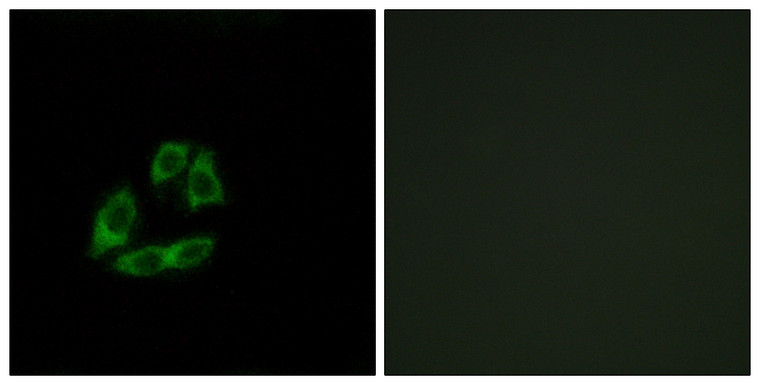| Host: |
Rabbit |
| Applications: |
WB/IHC/IF/ELISA |
| Reactivity: |
Human/Mouse/Rat |
| Note: |
STRICTLY FOR FURTHER SCIENTIFIC RESEARCH USE ONLY (RUO). MUST NOT TO BE USED IN DIAGNOSTIC OR THERAPEUTIC APPLICATIONS. |
| Short Description: |
Rabbit polyclonal antibody anti-Arfaptin-1 (271-320 aa) is suitable for use in Western Blot, Immunohistochemistry, Immunofluorescence and ELISA research applications. |
| Clonality: |
Polyclonal |
| Conjugation: |
Unconjugated |
| Isotype: |
IgG |
| Formulation: |
Liquid in PBS containing 50% Glycerol, 0.5% BSA and 0.02% Sodium Azide. |
| Purification: |
The antibody was affinity-purified from rabbit antiserum by affinity-chromatography using epitope-specific immunogen. |
| Concentration: |
1 mg/mL |
| Dilution Range: |
WB 1:500-1:2000IHC 1:100-1:300IF 1:200-1:1000ELISA 1:40000 |
| Storage Instruction: |
Store at-20°C for up to 1 year from the date of receipt, and avoid repeat freeze-thaw cycles. |
| Gene Symbol: |
ARFIP1 |
| Gene ID: |
27236 |
| Uniprot ID: |
ARFP1_HUMAN |
| Immunogen Region: |
271-320 aa |
| Specificity: |
Arfaptin 1 Polyclonal Antibody detects endogenous levels of Arfaptin 1 protein. |
| Immunogen: |
The antiserum was produced against synthesized peptide derived from the human ARFIP1 at the amino acid range 271-320 |
| Post Translational Modifications | Phosphorylated by PRKD1.phosphorylation delocalizes ARFIP1 from the Golgi and disrupts its ability to inhibit the activity of ADP-ribosylation factor, an important component of the vesicle scission machinery. |
| Function | Plays a role in controlling biogenesis of secretory granules at the trans-Golgi network. Mechanistically, binds ARF-GTP at the neck of a growing secretory granule precursor and forms a protective scaffold. Once the granule precursor has been completely loaded, active PRKD1 phosphorylates ARFIP1 and releases it from ARFs. In turn, ARFs induce fission. Through this mechanism, ensures proper secretory granule formation at the Golgi of pancreatic beta cells. |
| Protein Name | Arfaptin-1Adp-Ribosylation Factor-Interacting Protein 1 |
| Cellular Localisation | Golgi ApparatusTrans-Golgi Network Membrane |
| Alternative Antibody Names | Anti-Arfaptin-1 antibodyAnti-Adp-Ribosylation Factor-Interacting Protein 1 antibodyAnti-ARFIP1 antibody |
Information sourced from Uniprot.org
12 months for antibodies. 6 months for ELISA Kits. Please see website T&Cs for further guidance









